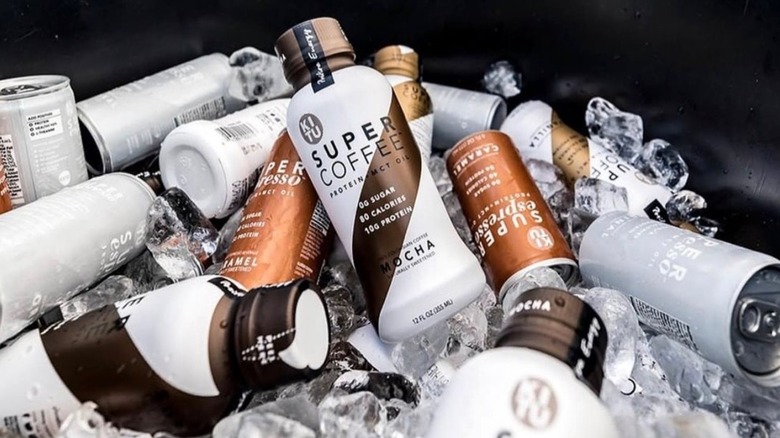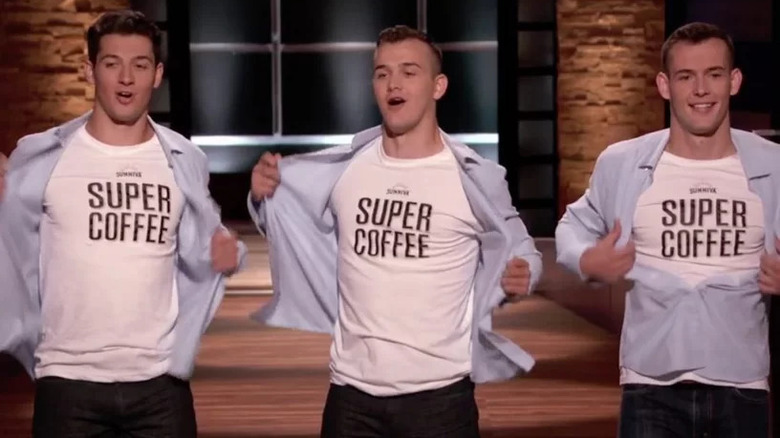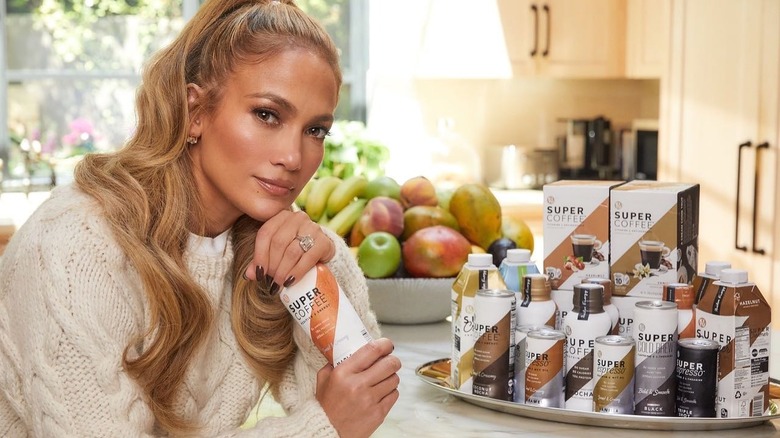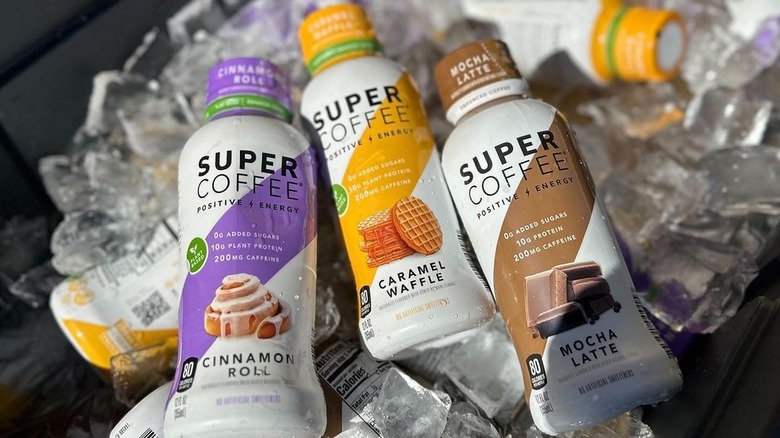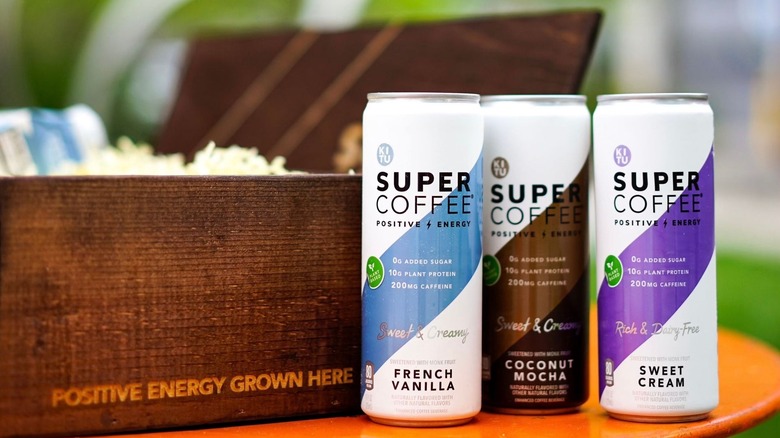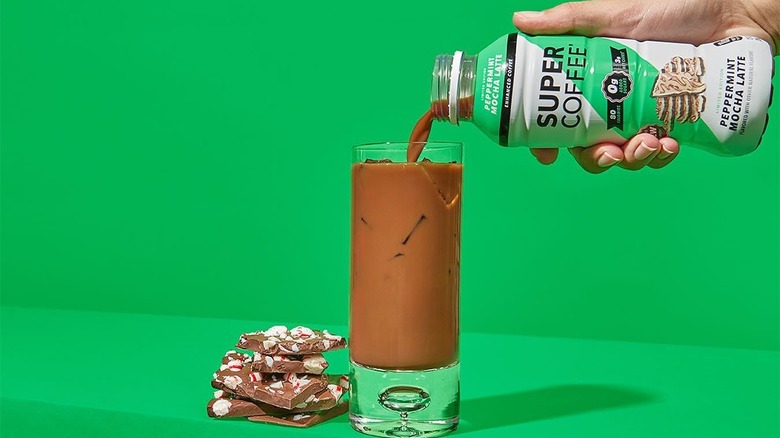Super Coffee: Here's What Happened After Shark Tank
We may receive a commission on purchases made from links.
Super Coffee isn't your average cup of joe. The ready-to-drink coffee brand churns out a variety of enhanced caffeinated beverages but with a positive energy twist: They're made without artificial ingredients or added sugars.
College athlete Jordan DeCicco, a point guard for the Philadelphia University men's basketball team, founded the company (then called Sunniva Super Coffee) back in 2015. Unimpressed with the slew of unhealthy bottled energy drinks and sugar-laden coffees that were readily stocked on store shelves, he sought an alternative to help fuel him through classes after his workouts. So, he decided to brew up something better in the comfort of his own dorm room — and Super Coffee was born.
DeCicco later dropped out of college and enlisted the help of his two brothers, Jimmy and Jake, to help grow the company. However, the athletic trio still needed investors to help take Super Coffee to the next level. So they decided to bring their energizing beverage to the Tank during season 9, episode 22 of the hit show, which aired in February 2018. But would any of the Sharks be interested in coaching their team?
What happened to Super Coffee on Shark Tank?
Seeking a $500,000 investment for a 4.5% stake in the company, the brothers passed out samples to the Sharks — Mark Cuban, Robert Herjavec, Barbara Corcoran, Lori Greiner, and Rohan Oza. The investors sipped on four flavors, vanilla bean, maple hazelnut, dark mocha, and unsweetened black brew, which were made with organic Arabica beans from Colombia and blended with lactose-free protein and coconut oil.
Naturally sweetened with organic maple syrup as well as organic stevia, Herjavec immediately didn't like the taste and was out. But the brothers shared that they'd already generated $600,000 in sales and were on track to make $2.1 million that year, which piqued the Sharks' interest. Super Coffee had also partnered with Compass Group, one of the largest food service providers in the country, to get the ready-to-drink beverages in corporate cafeterias and college campuses. What's more, the brand was already stocked at Whole Foods, Target, Wawa, and Wegmans.
Although Corcoran liked the brothers' discipline and high energy, she definitely wasn't a fan of Super Coffee's aftertaste and was out. Cuban and Greiner swiftly followed suit, with the latter noting that she was concerned about the company's $10 million valuation. Oza, who shared the sentiment about the brand's high valuation, was also concerned that Super Coffee wasn't unique enough to stand apart from the many players that were already crushing the ready-to-drink beverage category and ultimately went out, leaving the trio to walk away without a deal.
Super Coffee after Shark Tank
After appearing on the show, Super Coffee quickly became the fastest-growing private company in the food and beverage space — and it's showing no signs of slowing down. In 2020, just two years after appearing on Shark Tank, Super Coffee was named the third most popular bottled coffee brand in the U.S., beat by only Dunkin' and Starbucks. Moreover, that same year, the company's revenue surged to $26 million in sales, garnering it a whopping $400 million valuation — probably much to the chagrin of Greiner and Oza.
As it turns out, the coffee company didn't need an investment from the Sharks after all. Leading athletes and celebrities like Aaron Rodgers, Baron Davis, and Patrick Schwarzenegger have invested in the brand. And, more recently, Alex Rodriguez and Jennifer Lopez became minority owners in Kitu Life, Inc., Super Coffee's parent company. The former, who said that he is fond of "winning companies" and "winning founders" in a press release, also noted he invested in the brand because the DeCicco brothers "fit the bill." An apparent home run in his eyes, Rodriguez shared that "they have built a strong business in a short time and [he looks] forward to helping the brand reach its full potential."
Is Super Coffee still in business?
Fast forward to today, and Super Coffee is still brewing strong. Since its inception, the company has added a slew of new flavors to the mix, including Caramel Waffle, Blueberry Muffin, Strawberry Glazed Donut, and seasonal treats like Pumpkin Pie Latte and Peppermint Mocha Latte. The brand has also expanded its range to include creamers, ground coffee, pods, and canned espressos. It even has a line of Super energy drinks in "tongue-smacking" flavors like Strawberry Lemonspark, Mixed Berryburst, and Mango Peachpop, which are all collagen-infused and contain zero grams of sugar.
Today, Super Coffee can now be found on Amazon and in more than 40,200 stores, including 7-Eleven, Sprouts Farmers Market, Publix, Walmart, and many, many more. And, it seems like the company is succeeding in its mission of making beverages that are as energizing as they are sugar-free. To date, the company claims to have removed more than 20 million pounds of sugar from the American diet.
What's next for Super Coffee?
What's next for Super Coffee remains to be seen. But one thing's certain: New drink items are probably on the horizon. The company is continually fueling growth with new innovative products, evidenced by the recent launch of Super Coffee XXTRA. The high-energy beverage is packed with 200 milligrams of caffeine and B vitamins all with zero grams of added sugar, per usual. The new release follows the February 2023 launch of Suped Up, a coffee-infused non-alcoholic beer produced in conjunction with the Athletic Brewing Company. The company has even stepped outside of the coffee space, partnering with Kane Footwear to design its own active recovery shoe made from sugarcane.
Super Coffee is certainly forging full steam ahead. From the bevy of new products to the company's decision to move its headquarters from New York City to Austin in 2021 amid its fast-growing expansion, much has certainly changed for the company since its early bootstrapping college days — including its executive team.
The oldest brother, Jimmy DeCicco, handed over the reins of CEO to Tyler Ricks in December 2022 as he moved into the role of chief brand officer and executive chairman. "My brothers and I are proud of the brand we're building, and we recognize what got us here, will not get us to where we are going," DeCicco wrote on LinkedIn about the transition. "We've come a long way from my little brother's dorm room, but our work here is just getting started."
Super Coffee experienced some turbulence but has big plans
Despite its A-list investors, Super Coffee sought extra funds towards the end of 2023. This included plans to raise a $10 million convertible note, which would have reduced the company's valuation to half what it was in 2021. Sales had dropped from $54 million in 2022 to $45 million in 2023, and the company discontinued several products — such as coffee grounds and plant-based creamers. This streamlining, however, was seen as a path to bigger future growth with the aim of becoming profitable strictly from sales rather than having to rely on a continual stream of investments.
The launch of coffee and energy drink Super Coffee XXTRA in 2023 proved a success, and the beverage launched nationwide in 2024. In fall 2024, a new caramel flavor was added to the line-up of XXTRA drinks. The company also brought back its Super Espresso, which had previously been discontinued, in larger 11-ounce cans.
Super Coffee reviews are still positive, with many praising the product for its taste — for example, the XXTRA product has received an average score of 4.2 from 150 reviews on Amazon. News of more new product launches, including releasing or bringing back seasonal specials, such as peppermint mocha latte and pumpkin pie latte, have received positive feedback on social media. And in 2024, the company expanded its partnership with technology brand Stord for omnichannel commerce software and fulfillment, showing a serious ambition to be better able to manage inventory issues and achieve more profitable growth.

